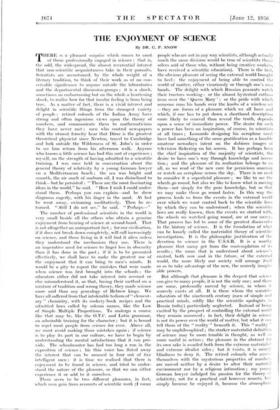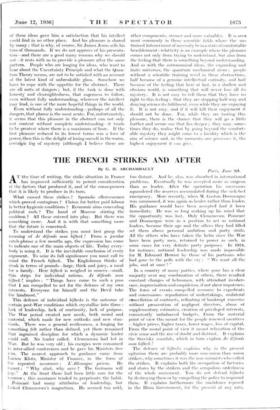THE ENJOYMENT OF SCIENCE
By DR. C. P. SNOW
THERE is a pleasant surprise which conies to most of those professionally engaged in science : that is, the odd, the widespread, the almost reverential interest that non-scientific acquaintances take in their pursuits. Scientists are accustomed, by the whole weight of a literary tradition, to think of their work as of no con- ceivable significance to anyone outside the laboratories and the departmental discussion-groups ; it is a shock, sometimes an embarrassing but on the whole a heartening shock, to realise how far that insular feeling is from being true. As a matter of fact, there is a vivid interest and delight in scientific things from the strangest variety of people : retired colonels of the Indian Army have strong and often ingenious views upon the theory of numbers, and communicate them to mathematicians they have never met ; men who control newspapers with the utmost ferocity hear that Dirac is the greatest theoretical physicist since Newton, travel to Cambridge and lurk outside the Wilderness of St. John's in order to see him return from his afternoon walk. Anyone who knows a little science has had this sort of experience ; myself, on the strength of having admitted to a scientific training, I was once held in conversation about the general theory of relativity by a young German lawyer on a Mediterranean beach ; the sea was bright and smooth, the air smelt of sunburn oil, I was disinclined to think—but he persisted : " These are the most fascinating ideas in the world," he said. "How I wish I could under- stand them. Perhaps you can explain—and he drew diagrams eagerly, with his finger in the sand. At last he went away, swimming meditatively. Then he re- turned. " Still I do not see," he said. " Perhaps—" The number of professional scientists in the world is very small beside all the others who obtain a genuine enjoyment from hearing of science at second-hand; That is not altogether an unimportant fact.; for our civilisation, if it does not break down completely, will call increasingly on science, and those living in it will find it alien unless they understand the mechanism they use. There is an imperative need for science to linger less in obscurity than it has done in the past ; if it is to be presented effectively, we shall have to make the greatest use of the enjoyment that it can bring to men's minds. It would be a pity to repeat the mistakes that were made when science was first brought into the schools : the educators either did not take interest into account or else misunderstood it, so that, basing their method on a mixture of tradition and wrong theory, they made science more arid than any genealogy of Hebrew kings. We have all suffered from that intolerable tedium of " element- ary " chemistry, with its cookery-book recipes and the nitwitted laws called by solemn names, like the Law of Simple Multiple Proportions. To undergo a course like that may be, like the O.T.C. and Latin grammar, an admirable training for the character ; but it is bound to repel most people from science for, ever. Above all, we must avoid making those mistakes again ; if science is to play its part in our culture, we have to begin by understanding the mental satisfactions that it can pro- vide. The schoolmaster has had too long a run in the exposition of science ; his thin voice has fluted away the interest that can be aroused in four out of five intelligent men ; it is time we realised that there is enjoyment to be found in science, and tried to under- stand the nature of the pleasure, so that we can either experience it or add to it ourselves.
There seem to be two different pleasures, in fact, which men gain from accounts of scientific work (I mean people who are not in any way scientists, although actually much the same division would be true of scientists them- selves add of those who, without being creative workers, have received a scientific education). There is the first, the obvious pleasure of seeing the external world brought to heel : the enjoyment .of being able to control the world of matter, either vicariously or through one's own hands. The delight with which Russian peasants watch their tractors working : or the almost hysterical enthus- iasm over the ' Queen Mary ' : or the pride with which someone runs his hands over the knobs of a wireless set —they are forms of a pleasure which we all have and which, if one has to put down a shorthand description more likely to conceal than reveal the truth, depends upon a sense of immediate power. The desire for such a power has been an inspiration, of course, to scientists at all times ; Leonardo designing his aeroplane must have had something of the same gratification as a humble amateur nowadays intent on the dubious images of television flickering on his screen. It has perhaps been the chief inspiration of the majority of scientists, the desire to have one's way through knowledge and inven- tion ; and the pleasure of its realisation belongs to us all, as we read of the new cure for pernicious anaemia or watch an aeroplane across the sky. There is no need to consider it a superficial pleasure ; we like to sec the wheels go round, but also we like to know what is moving them—not simply for the pure knowledge, but so that we may make them go round faster. In this way the process leads us from the events in the external world over which we want control back to the scientific laws by which they can be understood ; when the scientific laws are really known, then the events we started with, the wheels we watched going round, are at our mercy. That process has led to some of the greatest discoveries in the history of science. It is the foundation of what can be loosely called the materialist theory of scientific investigation. It is the philosophic justification of the devotion to science in the U.S.S.R. It is a worthy pleasure that many get from the contemplation of its results ; the more that is understood about science's control, both now and in the future, of the external world, the more likely our society will arrange itself so as to take advantage of the new, the scarcely imagin- able powers.
But although that pleasure is the deepest that science can give to many people, it is not the only one; and there are some, profoundly moved by science, in whom it scarcely exists at all. It is these whom the scientific educators of the nineteenth century (men of simple and practical minds, oddly like the scientific apologists in Russia today) particularly neglected. Instead of being excited by the prospect of controlling the external world they remain unmoved ; in fact, their delight in science is not its power over the world of matter, but what it can tell them of the " reality " beneath it. This " reality " may be unphilosophical ; the starker materialist definition of science may be more tenable in thought, as well as more useful in action ; the pleasure in the abstract for its own sake is assailed both from the extreme materialist and extreme idealist "sides ; but it exists, it is merely blindness to deny it. The retired colonels who amuse themselves with the mysterious properties of numbers are moved neither by a desire to alter their material environment nor by a religious intimation ; my young' German lawyer indulged his passion for the theory relativity, not for a practical end however remote, bet simply because he enjoyed it, because the atmosphere of these ideas gave him a satisfaction that his intellect could find in no other place. And his pleasure is shared by many ; that is why, of course, Sir James Jeans sells his tens of thousands. If we do not approve of his presenta- tion—and there are a good many reasons why we should not—it rests with us to provide a pleasure after the same pattern. People who are longing for ideas, who want to hear about the Uncertainty Principle and what the Quan- tum Theory means, are not to be satisfied with an account of the latest kind of unbreakable glass. Somehow we have to cope with the appetite for the abstract. There are. all sorts of dangers ; but, if the task is done with honesty and clearsightedness, that eagerness to follow, even without fully understanding, wherever the intellect may lead, is one of the more hopeful things in the world.
Even without fully understanding—perhaps of all the dangers, that phrase is the most acute. For, unfortunately, it seems that this pleasure in the abstract can not only rest content without complete understanding—it tends to be greatest where there is a maximum of haze. If the first pleasure reduced to its lowest terms was a love of power, then this is the delight of losing oneself in the warm, nostalgic fog of mystery (although I believe there are other components, sterner and more valuable). It is seen most commonly in those scientific fields where the un- trained listener must of necessity be in a state ofeomfortable bewilderment : relativity is an example where the pleasure comes not only from trying to understand, but also from the feeling that there is something beyond understanding. And so with the astronomical ideas, the expanding and finite universes, the quantum mechanical atom ; people without a scientific training revel in these abstractions, half because of a genuine intellectual curiosity, and half because of the feeling that here at last, in a shallow and obvious world, is something that will never lose all its mystery. It is not easy to tell them that they have no right to this feeling : that they are stopping half-way and denying science its fulfilment. even while they are enjoying it. It is not easy, and if it will kill their enjoyment it should not be done. For, while they are tasting this pleasure, there is the chance that they will go a little further and secure one that lies deeper ; they may, some- times they do, realise that by going beyond the comfort- able mystery they might conic to a lucidity which is the aim of science and. in the moments one possesses it, the highest enjoyment it can give.























































 Previous page
Previous page